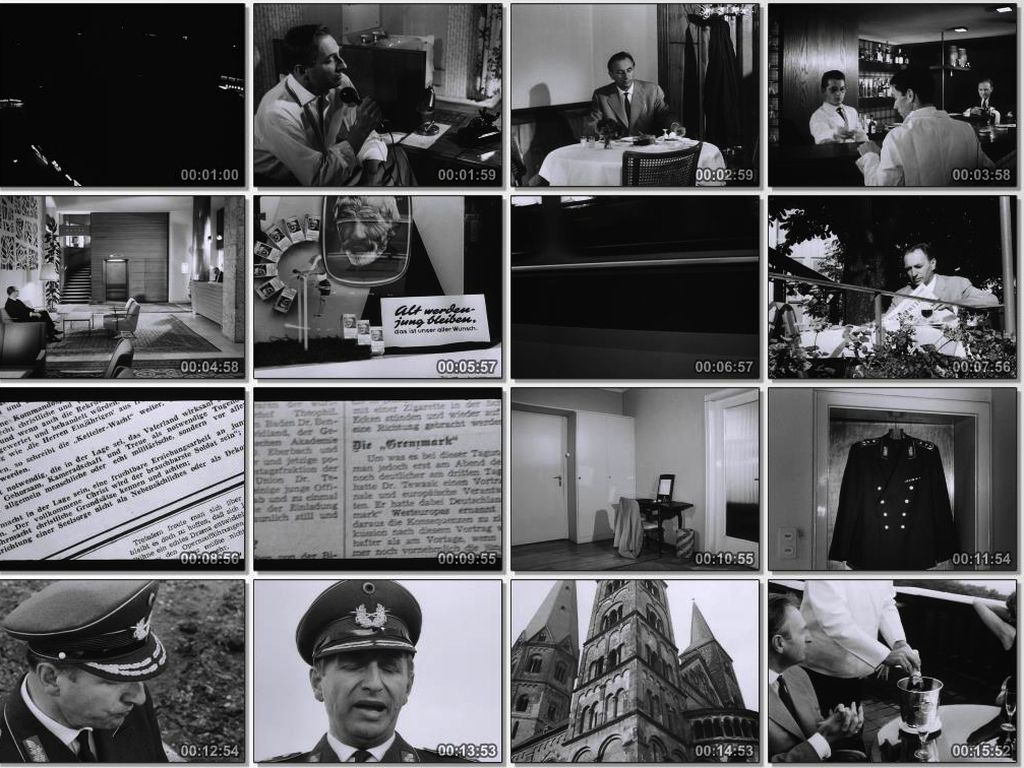
MACHORKA MUFF
27. AUFF,GÖSTERİMLER / SCREENINGS,DENEYSEL FİLM VE VİDEO / EXPERIMENTAL FILM AND VIDEO,Bakış Makineleri: Deneysel Filmin Tarihi / Vision Machines: History of Experimental Cinema
Takvime Ekle
Europe/Istanbul
MACHORKA MUFF
Almanya Germany, 1962, 13’, Siyah-Beyaz Black and White, 16mm
Sanatçı / Artist: J. - M. Straub, Danièle Huillet
Dünya Hakları / World Sales: Sanatçıya ait Courtesy of Artist
Straub ve Huillet'in tarzının kaynağı Heinrich Böll hikayesi üzerine kurulu ilk kısa filmlerinde görülmektedir ama asıl Böll etkisi, Almanya'nın yeniden silahlanmasının (Böll'un hikayesi, Bundeswehr kurulmasından bir yıl sonra yazılmıştır) bu taşlamasında kendine göstermektedir. Filmin en iyi sahnesinde, gözden düşmüş ve hayatını kaybetmiş bir general, kaybettiği namını, birliğinin önceden sanıldığı gibi 8300 değil, 14700 kayıp verdiğinin anlaşılmasıyla geri kazanıyor. Bir yandan, Machorka-Muff'ın, yedi kere boşanmış asil sevgilisi ile evlenmenin iyi ve kötü yanlarını saydığı sırada ettiği laubali lafı anımsatırken bir yandan da Machorka-Muff'ın yedi savaş yarası ile bir simetri oluşturuyor.
The seeds of Straub-Huillet's style can easily be seen in their first short, based on a Heinrich Boll story, but the Boll influence really shines through in this satire of German rearmament (the Boll story was written a year after the establishment of the Bundeswehr). In the best scene, a disgraced late general has his reputation rehabilitated after it's determined that his unit had 14,700 casualties, instead of 8,300 as previously thought, which proves mathematically that they fought with an acceptable level of bravery. It's reminiscent of the throwaway line when Machorka-Muff is weighing the pros and cons of marrying his aristocratic girlfriend - she's been divorced seven times, but on the other hand, there's a nice symmetry with Machorka-Muff's seven war wounds.
Jean-Marie Straub ve Danièle Huillet
Jean-Marie Straub (d. 8 Ocak 1933, Metz, Fransa) ve Danièle Huillet (1 Mayıs 1936, Paris – 9 Ekim 2006, Cholet) 1963-2006 arasında iki düzine film yapmış, beraber çalışan sinemacılardır. Filmleri, sert ve entellektüel tarzlarıyla bilinmektedir. İkisi de Fransız olmalarına rağmen, çoğunlukla Almanya ve İtalya'da çalışmışlardır. From the Clouds to the Resistance (1979) ve Sicilia! (1999), ikilinin en başarılı eserleri olarak gösterilmektedir.
Jean-Marie Straub (born 8 January 1933, Metz, France) and Danièle Huillet (1 May 1936, Paris – 9 October 2006, Cholet) were a duo of filmmakers who made two dozen films between 1963 and 2006. Their films are noted for their rigorous, intellectually stimulating style. Though both were French, they worked mostly in Germany and Italy. From the Clouds to the Resistance (1979) and Sicilia! (1999) are considered the duo's finest works.
Sanatçı / Artist: J. - M. Straub, Danièle Huillet
Dünya Hakları / World Sales: Sanatçıya ait Courtesy of Artist
Straub ve Huillet'in tarzının kaynağı Heinrich Böll hikayesi üzerine kurulu ilk kısa filmlerinde görülmektedir ama asıl Böll etkisi, Almanya'nın yeniden silahlanmasının (Böll'un hikayesi, Bundeswehr kurulmasından bir yıl sonra yazılmıştır) bu taşlamasında kendine göstermektedir. Filmin en iyi sahnesinde, gözden düşmüş ve hayatını kaybetmiş bir general, kaybettiği namını, birliğinin önceden sanıldığı gibi 8300 değil, 14700 kayıp verdiğinin anlaşılmasıyla geri kazanıyor. Bir yandan, Machorka-Muff'ın, yedi kere boşanmış asil sevgilisi ile evlenmenin iyi ve kötü yanlarını saydığı sırada ettiği laubali lafı anımsatırken bir yandan da Machorka-Muff'ın yedi savaş yarası ile bir simetri oluşturuyor.
The seeds of Straub-Huillet's style can easily be seen in their first short, based on a Heinrich Boll story, but the Boll influence really shines through in this satire of German rearmament (the Boll story was written a year after the establishment of the Bundeswehr). In the best scene, a disgraced late general has his reputation rehabilitated after it's determined that his unit had 14,700 casualties, instead of 8,300 as previously thought, which proves mathematically that they fought with an acceptable level of bravery. It's reminiscent of the throwaway line when Machorka-Muff is weighing the pros and cons of marrying his aristocratic girlfriend - she's been divorced seven times, but on the other hand, there's a nice symmetry with Machorka-Muff's seven war wounds.
Jean-Marie Straub ve Danièle Huillet
Jean-Marie Straub (d. 8 Ocak 1933, Metz, Fransa) ve Danièle Huillet (1 Mayıs 1936, Paris – 9 Ekim 2006, Cholet) 1963-2006 arasında iki düzine film yapmış, beraber çalışan sinemacılardır. Filmleri, sert ve entellektüel tarzlarıyla bilinmektedir. İkisi de Fransız olmalarına rağmen, çoğunlukla Almanya ve İtalya'da çalışmışlardır. From the Clouds to the Resistance (1979) ve Sicilia! (1999), ikilinin en başarılı eserleri olarak gösterilmektedir.
Jean-Marie Straub (born 8 January 1933, Metz, France) and Danièle Huillet (1 May 1936, Paris – 9 October 2006, Cholet) were a duo of filmmakers who made two dozen films between 1963 and 2006. Their films are noted for their rigorous, intellectually stimulating style. Though both were French, they worked mostly in Germany and Italy. From the Clouds to the Resistance (1979) and Sicilia! (1999) are considered the duo's finest works.
T.G. 6852
Twitter'da AnkaraFF
27. AUFF
-
ODALAR / ROOMS
-
ROHFILM
-
YENİDEN ÇERÇEVELEME / REFRAME
-
ESİR UFUK / CAPTIVE HORIZON
-
YILDIRIM / LIGHTNING STRIKES
-
YAZLIK / SECOND HOME
-
ADOLF WINKELMANN, KASSEL, 09.12.67, 11.54H
-
EMPOR
-
YALNIZLIK GİBİ AMA DEĞİL / IT SEEMS TO BE LONLINESS BUT IT IS NOT
-
ABU HAL'A'NIN OĞULLARI / THE SONS OF ABU HAL'A
- Tümünü Göster

